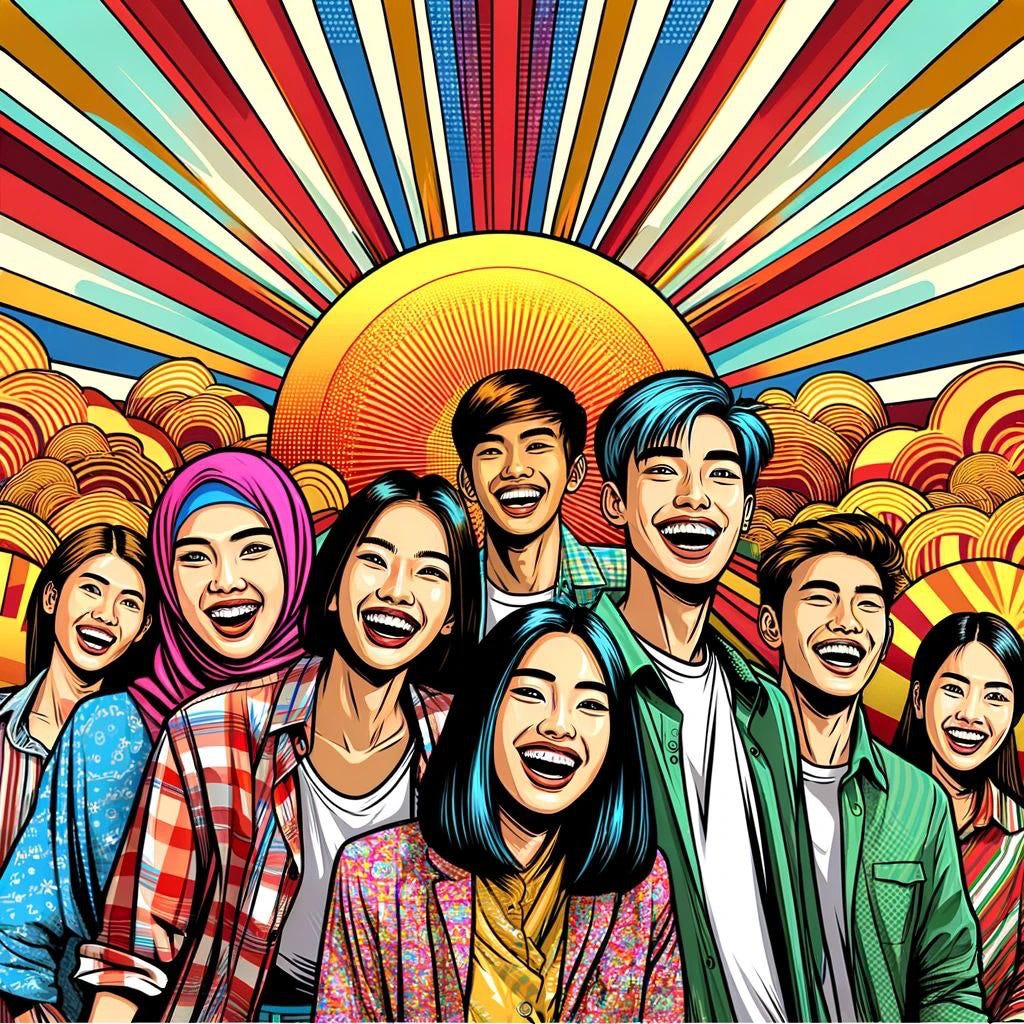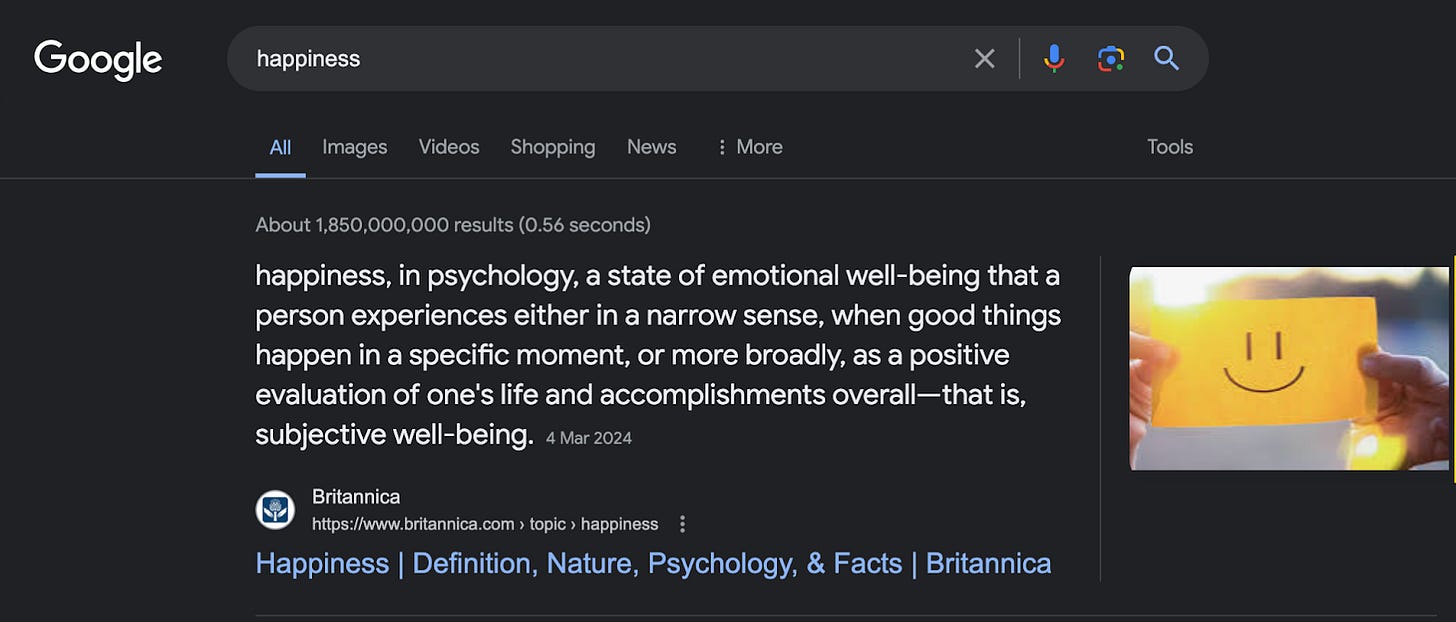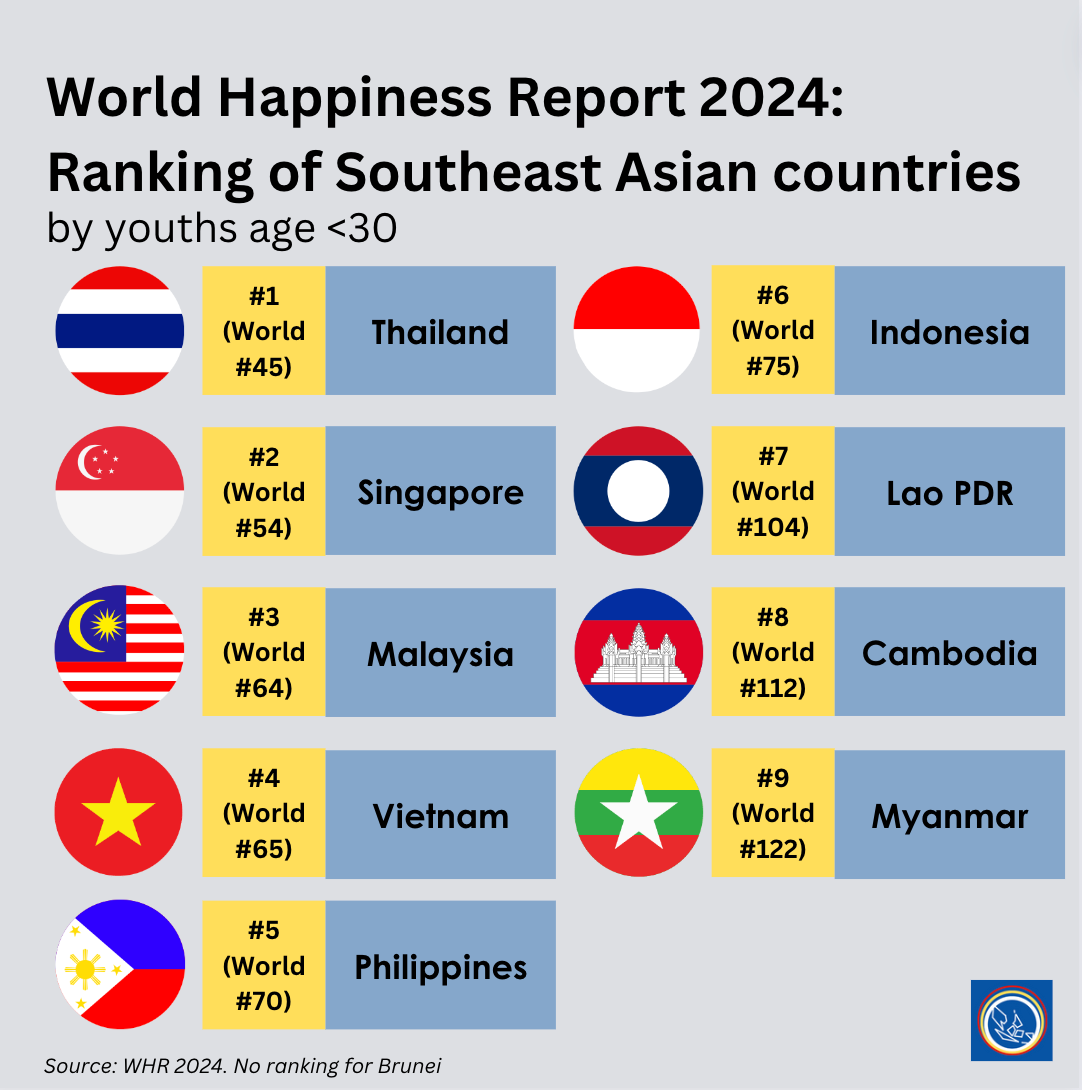Growing up: What does it mean for youths to be happy (or unhappy) in Southeast Asia?
Happiness rankings may not reflect the actual sentiments on the ground.
“Growing Up” is a series that explores issues that Southeast Asia’s youths - and politics - grapple with.
What does it mean to be “happy”?
Ask your friends, family, or neighbors, and they might have different opinions of what it means to be “happy”. A quick search on the term “happiness” on Google also features a definition that–in our opinion–is a rather vague (or hard to understand) definition of what it means.
And in a diverse region like Southeast Asia (SEA), there could be different takes on the state of happiness and what it means to be “happy” in different countries. On Mar 20, the World Happiness Report 2024 was released, and the difference is already clear—just in terms of the world rankings for SEA countries.
In particular, rankings of SEA countries by youths below the age of 30 is different from the general rankings based on life evaluations or the six factors (GDP per capita, social support, healthy life expectancy at birth, freedom to make life choices, generosity, and perceptions of corruption).
Singapore may be SEA’s “happiest” country in terms of average life evaluation, but Thailand is the happiest country instead amongst youths below the age of 30.
But do these rankings truly reflect the sentiments of youths in Southeast Asia?
We asked three youths from Indonesia, Singapore, and Vietnam in their 20s what they felt about the report, how they perceived happiness, whether political issues affect happiness, and whether there is enough support to help youths to be happy.
Their views are personal and they do not necessarily reflect the youth sentiment in their country.
“Regarding the report, I think I agree with it because life in Indonesia is just so-so. We are not too happy, but we are not unhappy or depressed at the same time. So it is probably a fair rank for Indonesia.
Life quality in Indonesia is not that great. There are many problems, like inflation, unemployment, and low salary. At the same time, corruption, poor government performance, and ineffective public policies could lead to unhappiness. I believe that corruption will result in a dysfunctional government, and this could lead to poverty, unemployment, and a crisis.
I can’t speak for the entire population of Indonesia, but within my immediate circle of friends, we are unhappy with corruption because imagine this—if your hard-earned taxpayers money results in corruption, will that make anyone happy? The answer is probably ‘no’.
At the same time, it is somehow easy for us to get away with those problems because Indonesia has a lot of free cool places to unwind and an abundance of cheap and delicious food. But given that we live in a digital era, social media can affect our state of happiness.
We sometimes use what other people show on social media as a parameter of our happiness. For example, singles may not have a problem with being single, but if the feed is filled with photos of couples, they could feel that they are missing out. But I feel that many things on social media display an illusionary effect, and we should just live life to the fullest and not compare our state of happiness with others on social media.
For now, being happy to me means accomplishing my goals. I’m currently working full-time and applying to graduate school, and I would be very happy if I reached a milestone at work or got accepted into the school that I want to go to. Besides that, a glass of boba (bubble tea) would make me very happy at the end of a stressful day too.
My family is also my top source of happiness. Maybe because I don’t hang out with friends often, hence I would always spend time with my family. I also think we all can agree that being a kid was the happiest stage of our life.
I feel that while youths today can find whatever makes them happy–such as hanging out with friends, going on a date, accomplishing a task at work, or just being with their family—but some form of mental health support would be great for the society. For now, I just hope that my family and I will be healthy and able to celebrate Eid together this month, and that alone would make me very happy.”
– Dilla (Indonesia)
“I’m not sure how to feel about the ranking. Ask any Singaporean under 30 and they might tell you that the report does not reflect the actual situation. I feel that Singaporeans travel to neighboring countries in Southeast Asia just to feel happier.
Happiness is a feeling that occurs when whatever you have –be it your mental health, social support, or material possessions–is enough. Growing up, my source of happiness came from what others gave me – care, attention, love, and support. I probably felt the happiest in my secondary school days as I was young enough to be oblivious to larger issues beyond myself and in society.
Now, I do feel that the state of corruption could affect how happy you are in your country, but satisfaction or approval ratings for governments could be a better indicator of happiness than just corruption alone. Other issues could also affect one’s happiness, so it is hard to pinpoint any aspect that should be weighed above the rest.
Nonetheless, there’s adequate support for youths to be happy, if you know where to find it, although I believe that it never hurts to have more support.”
– Sean (Singapore)
“Honestly, it is hard to define what happiness is. I feel that the ranking tries to put in place specific parameters, which does not correlate to what people think about. The definition of happiness can differ from person to person, and country to country, which will affect the accuracy of the results, and the report alone cannot represent everyone.
For example, if you go to the countryside in Vietnam, where there’s a possibility that good healthcare is unavailable, a local farmer might say that they are happy. I realized that although I’m highly educated, the more I know that society can have its downsides, the more unhappy I am. Not everything that is considered “good” would correlate to happiness.
There’s a lack of mental health support in Vietnam’s elite schools and major cities like Hanoi and Ho Chi Minh City. I feel that this is a problem with Asian societies–if people talk about mental health they are perceived as weak.
That said, I disagree with how corruption could affect our state of happiness, because how can you even define corruption? What is considered corruption in Singapore might not be the case in Vietnam, where political opponents can criticize each other as being corrupt just to earn political points. So it does not affect how happy I am in Vietnam.
But I acknowledge that other factors such as environment, healthcare, and education could affect my state of happiness. If the air is polluted, how can you be happy? If your parents are sick and they can’t get the healthcare they need, wouldn't you be sad?
Nonetheless, I feel happy when I do something good for others and society. It can be a random act of helping out an old man on the streets. It could be making a positive impact on Vietnam and the Vietnamese community in Singapore.
I also believe that everything is about seeking validation from others–and that could affect our state of happiness. When I was a child, I felt happy when I received validation from my parents after achieving a good grade. Today, I would feel happy if my work in building a Vietnamese community in Singapore is validated by leaders and influencers in the scene, but I also learned that there’s no way to please everyone.
Hence, it is my hope to run across the entirety of Vietnam without anyone hating me and anyone I love. That to me would be happiness.”
–Minh (Vietnam)
If you enjoyed today’s article, follow SEAmplified on Instagram and LinkedIn, hit the subscribe button below, or email the editors at tanzhantiam@gmail.com or tianwen.tay@seakoel.com if you have any feedback for us!







